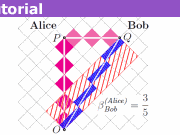Can I Send a Signal Faster than Light by Pushing a Rigid Rod?
One common proposal for achieving faster than light communication is to use a long perfectly rigid object and mechanically send signals to the other end by pushing, pulling, or tapping it. For instance; a hypothetical rigid rod linking two people several lightyears away. The fundamental idea is that when one end is moved the other end is disturbed instantaneously.
However, there is no such thing as a perfectly rigid rod: a mechanical disturbance at one end of any material can only move through the material at a finite speed. This speed is called the speed of sound in that material.
High stiffness materials like metal have a very high speed of sound and low stiffness materials like jello or air have a very low speed of sound. When you push on something made of jello, you can easily see that the disturbance propagates at a finite speed. When you push on something like metal, it is not so easy to see visually, but the disturbance still propagates at the finite speed of sound in the metal. (see e.g. https://www.physicsforums.com/showthread.php?p=4414855#post4414855)
The speed of sound in a diamond is about 12000 m/s which is about 25 thousand times slower than the speed of light (299792458 m/s). But what about some hypothetical “unobtainium”? Why couldn’t unobtainium’s speed of sound be faster than the speed of light? The answer is that all materials, even unobtainium, are held together by electromagnetic forces at the molecular level. When one molecule moves then the change in its electromagnetic field propagates to its neighboring molecule at the speed of light. So even in principle, it is not possible for any material to have a speed of sound faster than the speed of light.
The following forum members have contributed to this FAQ:
DaleSpam
Ryan_m_b
DrGreg
tiny-tim
with additional review and discussion by several others
This article was authored by several Physics Forums members with PhDs in physics or mathematics.








Leave a Reply
Want to join the discussion?Feel free to contribute!